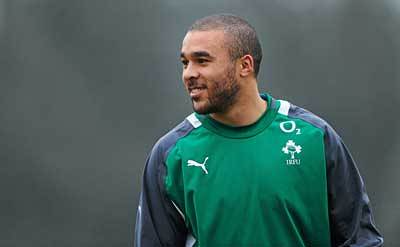

That situation is nothing new though, the League of Ireland has been ignored by national managers for decades now. What’s relatively new though is the quandary faced by top rugby talents who fancy a new challenge. Unlike their footballing counterparts they must weigh up the importance of their international career, and decide whether the change in scenery, and all it entails, is worth jeopardising their place in the national team. In the case of Simon Zebo, who it’s been reported will join Racing 92 at the end of the season, it obviously is.
Despite still being a Munster player, Zebo hasn’t been included in Ireland’s squad for this year’s Autumn internationals. If there was any doubt as to the consequences of his decision it was laid bare in this immediate, ruthless, exclusion. Having played in all but two of Ireland’s games last season, and been capped 35 times since his debut in 2012, Zebo is now persona non grata, an outcast, the one whose name we dare not speak. And he will remain that way until he realises the errors of his ways and returns from his jolly in Paris.
Regardless of his motivations, whether it’s money, French cuisine or escaping the interminable Limerick rain, Zebo has made one hell of a decision. In choosing to step away from the Irish side at the age of 27 he risks missing out on not just a succession of Six Nations, but also a World Cup. The Top 14 may stimulate the flamboyant winger in a way that the Pro14 no longer can, but in rugby the international game is king and nothing, not even yearly clashes with Lyon and Montpellier, can replicate the thrill, the hype, the buzz of representing your country.

That’s just capitalism though, just market forces in operation. A few weeks ago, I fantasised about a Manchester United team full of Mancunians, a Champions League featuring strong Dutch sides, strong Italians, Romanians and Greeks. But those days are gone. No-one, regardless of their profession, should be forced to remain within their homeland, eking out a living when there are better opportunities elsewhere. Globalisation has torn such barriers down, the very notion of the nation state more tenuous than it’s ever been.
We saw first-hand what persisting with this policy can do to a rugby nation on Saturday evening. While the Irish performance was impressive, it was against a South African team shorn of approximately 300 players. That’s the number of Springboks operating outside of their national league. Perhaps not all of those players are good enough to be selected for international duty, but in persisting with this outdated policy the SARU are asking Allister Coetzee and his staff to work with their hands tied behind their back. If we denied Joe Schmidt the opportunity to select 300 eligible players he’d struggle to put a team out at all.
The ultimate irony in all this is that on Saturday, with Zebo watching from afar, a New Zealander with not an iota of Celtic heritage made his debut for Ireland. And Bundee Aki’s commitment to the cause could not be faulted, nor can his decision to take advantage of the residency rules. One can only surmise the message being sent out by rugby’s governing bodies at this juncture, but it appears to be: it’s not where you’re from, but where you’re at.









